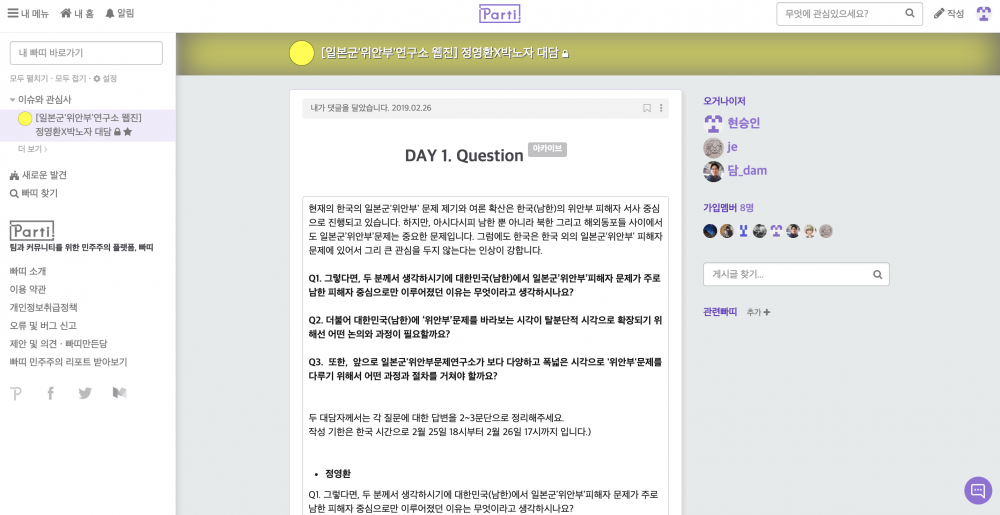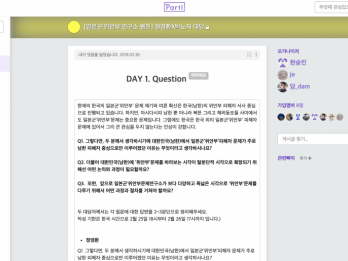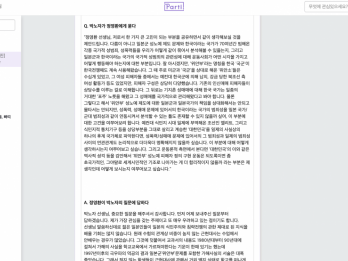Online Interview between Jeong Yeong-hwan & Pak Noja
The issue of the ‘comfort women’ that needs to be viewed from a post-division perspective DAY 1
In Korea, raising the issue and spreading public opinion on the ‘comfort women’ in the Japanese military are often centered around the narrative of the comfort woman victims in Korea (South Korea). However, the issue of the ‘comfort women’ in the Japanese military is most certainly important, not only in South Korea but also in North Korea as well as among overseas Koreans. The webzine
The first interlocutor, Professor Jeong Yeong-hwan is a ‘third-generation Korean resident in Japan with the nationality of Joseon’ who was born in Chiba Prefecture, Japan, but did not naturalize as a Japanese citizen or change his nationality to the Republic of Korea. Currently working as a professor at Meiji Gakuin University, he maintains a great interest in both Korean residents in Japan and the 'comfort women' issue. His leading work,
The interviews of the two professors who both take a broad view towards the issue of the ‘comfort women’ were held online for three days from February 25 to 27 due to time and physical factors.
<DAY 1>
Pak Noja
A1.
Pak Noja: In Korea, the 'comfort women' issue has been understood within the framework of nationalism. The issue of the sexual slavery victims has been understood in such a way that the Japanese Empire committed an act of outrage on ‘our’ - that is, the male-oriented community of nation/people - women. Since 'us' here usually refers to a community that has been established within the borders of 'Korea', I believe that other victims belonging to various places of residence, nationalities, and ethnic groups have not yet received sufficient attention.
A2.
The 'comfort woman' victims of the sexual slavery system reside in both South and North Korea. As for the people living in the North, many of them have their origins in South Korea, who, in fact, fall within the scope of 'separated families' in a broad sense. When the issue of the 'comfort women' is discussed, all victims, whether living in the South, North, or overseas, should also be included. Also, the efforts of overseas Korean organizations such as Chongryon or the General Association of Korean Residents who pioneered and have worked on the issue even before the 1990s, when the issue of the 'comfort women' was hardly ever discussed in both Koreas, should be well received in South Korea beyond the wall of division.
A3.
Overall, the 'comfort stations' constitute the wartime state crime of sexual violence and sexual slavery that violated the human rights of women from various regions, ethnicities, and countries. On this basis, it is imperative that it is not simply viewed as a 'Korea-Japan prism'. The primary nature of this issue is the act of gender violence by the Japanese state and military, but at the same time, the class aspect should not be ignored. In most cases, the daughters of poor peasants and poor people were most easily exposed to the violence of the Japanese military. Certainly, the primary responsibility for this crime lies with the Japanese state and military, and since it is a crime against humanity, there is, in principle, no statute of limitations. However, I believe that there still exists many issues that need to be raised against the dereliction of responsibility by the Allies who did not properly investigate the issue of the ‘comfort women’ and did not even include such an issue in the indictment in the Tokyo Trial during the post-war readjustment along with the attitudes of the officials of the Republic of Korea who rarely mentioned this issue during the negotiations for diplomatic normalization between Korea and Japan.

Jeong Yeong-hwan
A1.
When reviewing this matter, it is necessary to distinguish the fact-finding methods for the 'comfort women' issue in the Japanese military and the civic movement for addressing the past wrongdoings from the general public opinion or the media and political trends. The civic movement, which began in the 1980s, traversed the framework of 'South Korea' relatively early on and has since formed solidarity with Korean residents in Japan and the victims and activists in Japan, China, Southeast Asia, Europe, and the Democratic People's Republic of Korea. In this way, the movement to address the issue of the “comfort women” in the Japanese military was instilled with the character of cross-border solidarity among women from the very beginning, going beyond the South Korea-oriented perspective, and even holding meetings with the victims in the North in the 1990s.
One of the reaching points of this attempt was the Women's International War Crimes Tribunal on Japan's Military Sexual Slavery in 2000. Certainly, the background that enabled this attempt since the 1980s has been the fierce yet creative struggle of the women's liberation movement in Korea, and I believe it is important that this movement, in particular, had a post-division perspective. Currently, the movement to address the issue of the 'comfort women' in the Japanese military has gone beyond the framework of South Korea in regional and spatial terms. In addition to establishing ties and exchanging experiences with the victims, supporters, and activists in each region who suffered from the sexual violence of the Japanese military and inquiring into the responsibility of the Japanese military in solidarity, the movement has also formed coalitions with the victims of wartime sexual violence during the Korean military participation in the Vietnam War and during the Congolese Civil War, serving as a major driving force behind the movement to resolve the issue of universal wartime violence beyond the time limits.
The problem is that, when the results of the movement for a solution, which has been carried out in solidarity beyond the national framework, are reenacted in popular media or political circles in South Korea, it shifts into the perspective ‘oriented towards South Korean victims’. Since I live in Japan and generally don’t reside in South Korea, it is difficult to apprehend the issue in my daily life, but what I believe to be true is that the issue of the ‘comfort women’ in the Japanese military covered by Korean television, newspapers, and magazines is ‘oriented towards the victims in South Korea’ as you suggested. As Dr. Pak Noja pointed out, the cause of this perspective may well be the result of nationalism in Korea. However, if we examine this issue through historical stages, what matters here is that we should focus not only on the direct result of anti-communist nationalism since 1948 -- without doubt, we cannot grasp the issue of the ‘division perspective’ of Korea without anti-communism -- but also on the limitations and problems of nationalism after democratization in 1987 - the 'division perspective' held by the 1987 regime. Since this issue is related to the second question, I will come back to that later.
A2.
I believe that we should discuss what the 'post-division perspective’ represents while organizing/sharing the concept. I personally understood that the editorial team of the webzine
The 1965 regime 'sealed' these two discussions. The first is the 'seal' of discussions on the damages arising from Japanese colonial rule, and the second is the 'seal' of dialogue for peace and unification between the two Koreas. In other words, it was a regime in which the United States drove a wedge called Japan between the victims of the colonial period and the government, and between the two Koreas. There still remains the issue of the ‘comfort women’ in the Japanese military for the sake of employing the ‘division perspective’ because the multi-layered intertwined regime created by the post-war regime—1948, 1952, and 1965 regimes— continues to affect the perception of the issue of colonial damage in South Korea. In other words, this is an internal issue of nationalism in South Korea as well as an issue of the post-war regime as hierarchical international relations. After democratization in 1987, a retrial was conducted on the 1965 regime, but the 1948 regime still remains solid. On October 30, 2018, the Supreme Court's rejection of appeals to overturn an order requiring Nippon Steel & Sumitomo Metal Corporation to pay compensation was a valuable foundation for the 1965 regime. However, despite the fact that the plaintiffs included victims who underwent forced labor at the Chongjin Steel Mill at the end of the war, the issue of compensation for the damage sustained under colonial rule in the northern region has not yet been discussed, although this was a logical outcome as the case was subject to the Constitution of the Republic of Korea. Therefore I believe it is necessary to hold further discussions to fundamentally inquire about this post-war regime.
For another discussion necessary for broadening the view to a post-division perspective, I believe the combination of an anti-colonialism/anti-imperialism and feminist perspective is critical. At first, I started studying the history of Korean residents in Japan, but as I became increasingly involved in the discussion surrounding the <Comfort Women of the Empire> situation, I began to participate in the debate over the issue of the ‘comfort women’. What was considered to be a serious issue in the process was that the anti-colonial viewpoint was almost absent, especially from the mainstream feminist perspective in Japan. A perspective towards the debate in Korea through the post-nationalist/individualist/liberal viewpoint combined with the criticism over the statue of peace and the advocacy of the <Comfort Women of the Empire>. Even in Korea, anti-colonialism tends to be misinterpreted as the same concept as nationalism. However, the oppression generated by colonialism amplifies the division at the level of class and gender, while at the same time, excluding the ruled class ethnically. Since the sexual slavery system in the Japanese military completely exposed the violence of Japanese imperialism, a more in-depth review of anti-colonialism is necessary to expand the horizon of our vision. I believe that the value of the universality of women's rights will be able to exhibit its true qualities for the first time when combined with anti-colonial and anti-imperialist perspectives.
A3.
As I mentioned earlier, the movement for the solution has already achieved many practices based on the 'anti-division perspective'. As I continue to emphasize, the movement already had a 'diverse and broad perspective'. Even at this moment, such practices continue. The same can be said for the case with the Korean residents in Japan. The various practices and studies carried out by the surviving victims, activists, and researchers have already exceeded the scope understandable in terms of diplomatic relations between countries. We must now address the meaning of the movement for a solution again in the historical context and learn from their experiences. I hope that while learning from the tribunal in 2000, the atrocities and responsibilities of the Japanese military will be more systematically revealed, and through inter-Korean exchanges, the testimonies from North Korean victims and their bereaved families will be collected and they will be able to exchange their experiences. In addition, I look forward to the webzine becoming a foothold that bears the activists or researchers who continue to practice uncovering the truth about wartime violence under colonialism throughout the world.
Continue to Online Interview between Jeong Yeong-hwan & Pak Noja The issue of the ‘comfort women’ that needs to be viewed from a post-division perspective DAY 1
Related contents
-

- Online interview between Jeong Yeong-hwan & Pak Noja The issue of the 'comfort women’ that needs to be viewed from a post-division perspective DAY 2
-
Written by Jeong Yeong-hwan, Professor at Meiji Gakuin University, and Pak Noja, Professor at the University of Oslo
-

- Online interview between Jeong Yeong-hwan & Pak Noja The issue of the ‘comfort women’ that needs to be viewed from a post-division perspective DAY 3
-
Written by Jeong Yeong-hwan, Professor at Meiji Gakuin University, and Pak Noja, Professor at the University of Oslo
- Writer Jeong Yeong-hwan
-
메이지가쿠인대학 교양교육센터 교수. 역사학 특히 조선근현대사 및 재일조선인사 전공. 저서에 『朝鮮独立への隘路:在日朝鮮人の解放五年史』(法政大学出版局, 2013年), 『忘却のための「和解」:『帝国の慰安婦』と日本の責任』(世織書房,2016年, <누구를 위한 화해인가: <제국의 위안부>의 반역사성> 임경화역, 푸른역사, 2016년)등이 있다.
chong@gen.meijigakuin.ac.jp
- Writer Pak Noja
-
박노자 (블라디미르 티호노프)
오슬로대학교 인문학부 동방언어 및 문화연구 학과 교수, 한국학 및 동아시아학 전공. 현재로서 한국 민족주의 역사, 사회주의 운동 역사, 근현대 불교사, 사학사 등 연구 집중. 근작으로 <주식회사 대한민국>, <전환의 시대> 등 다수의 저서가 있으며, 금년에 발표된 논문으로 "Sin Ŏnjun (1904–1938) and Lu Xun’s Image in Korea: Colonial Korea’s Nationalist Transnationalism", "The Rise and Fall of the New Right Movement and the Historical Wars in 2000s South Korea" 등이 있다.
vladimir.tikhonov@ikos.uio.no